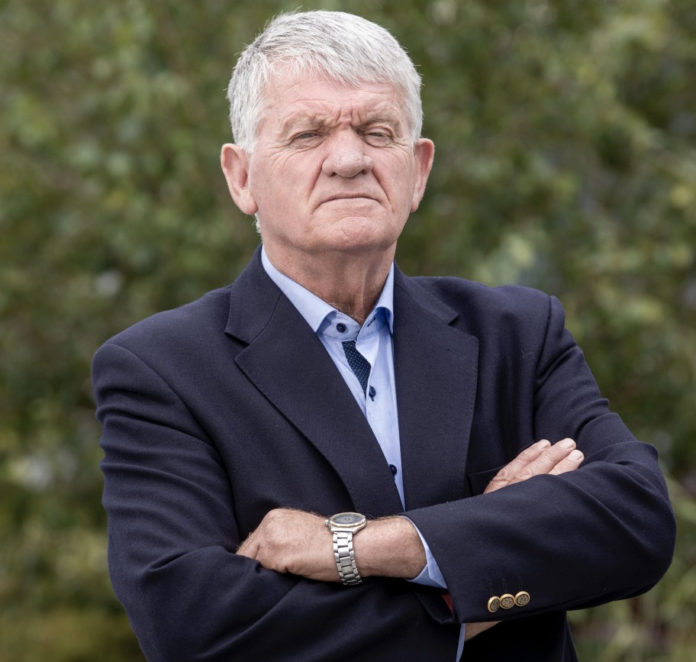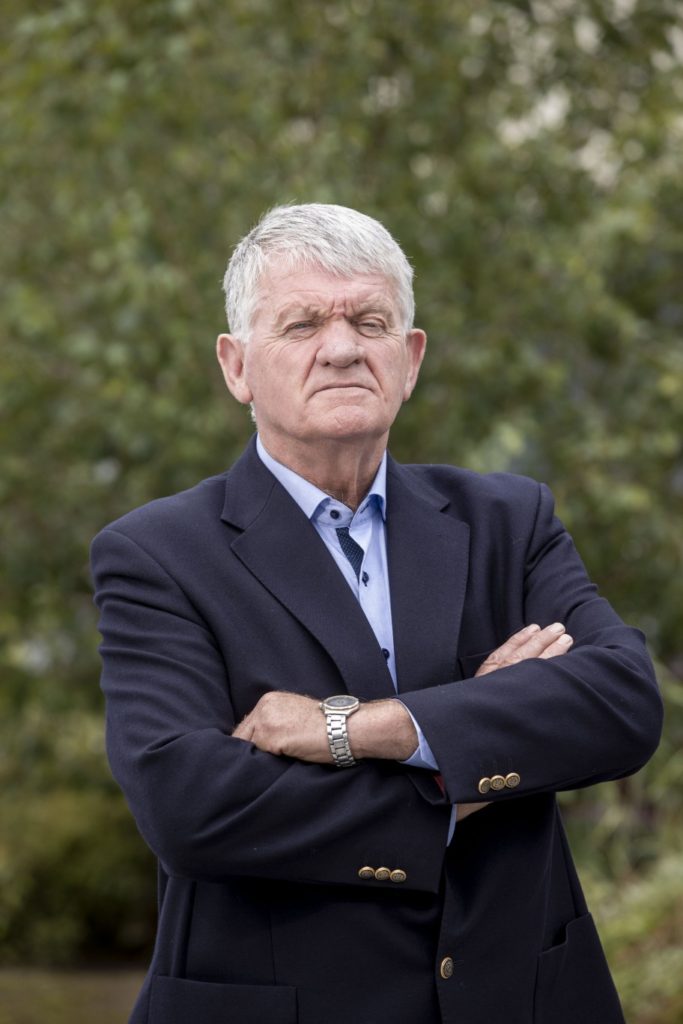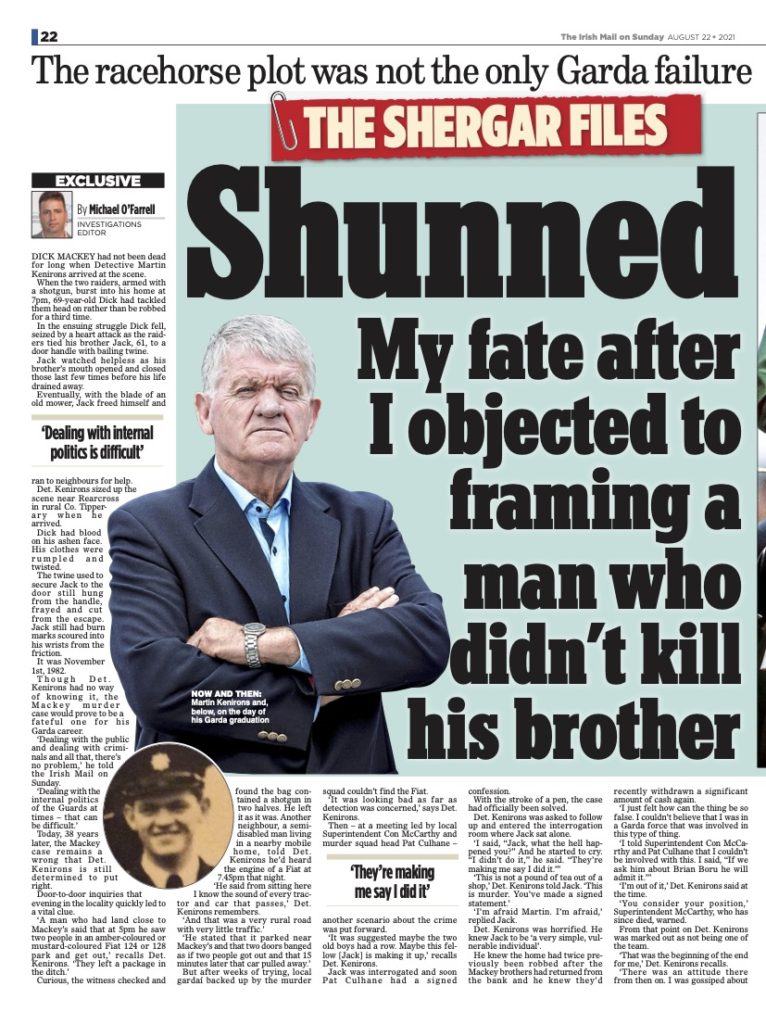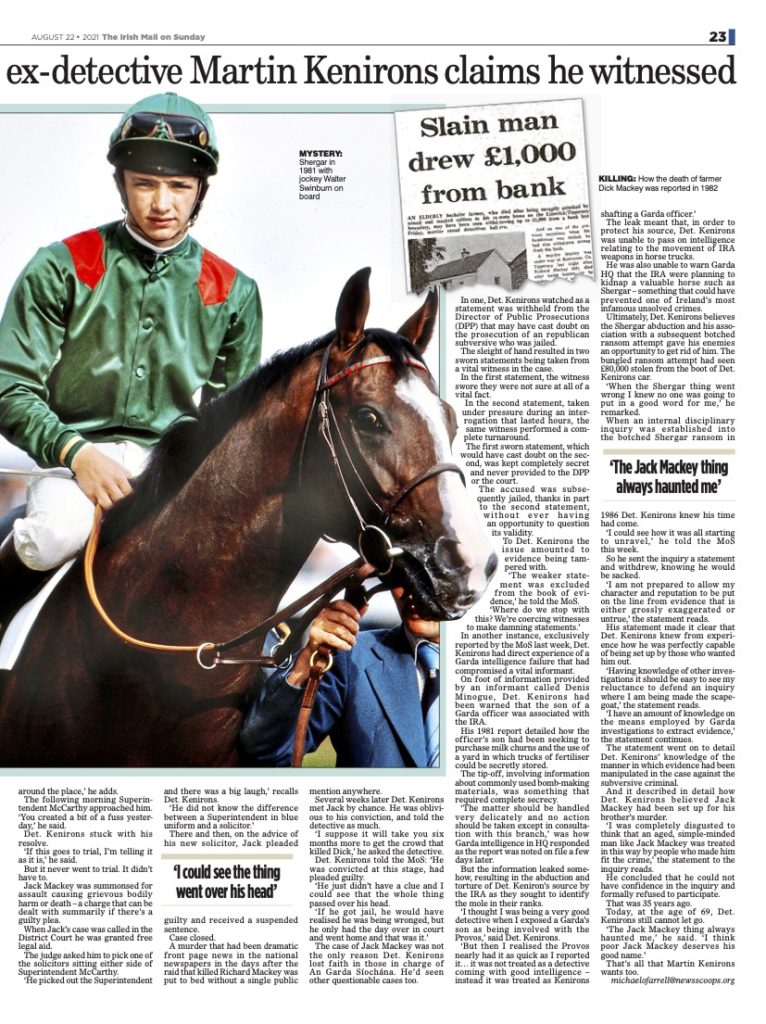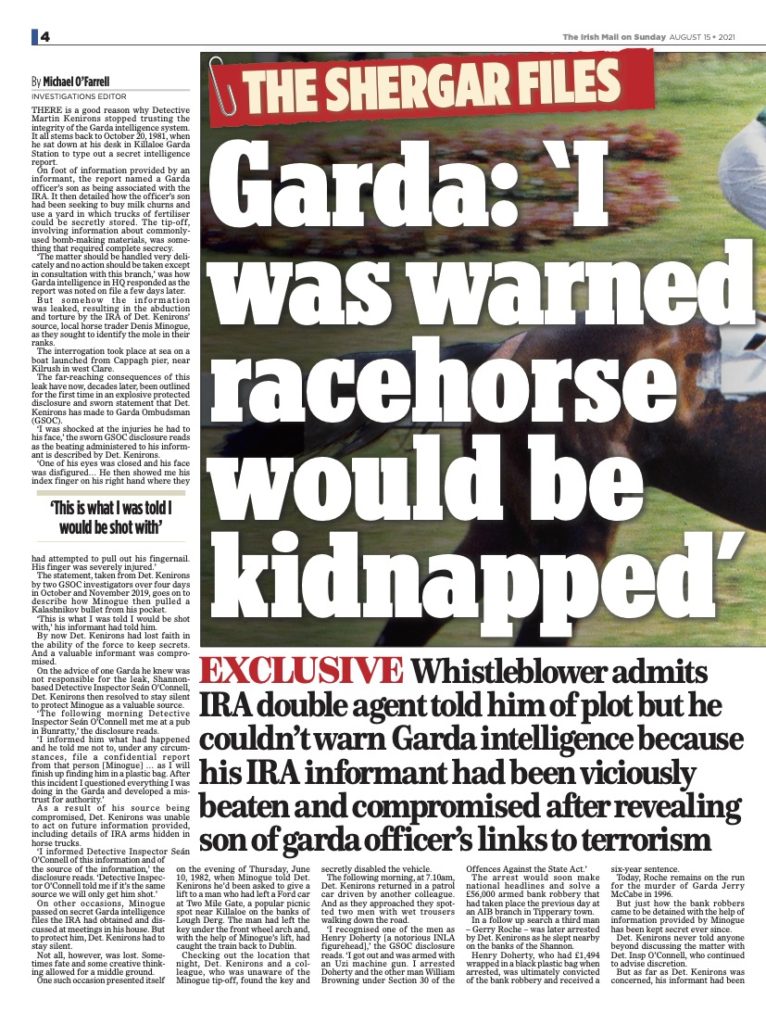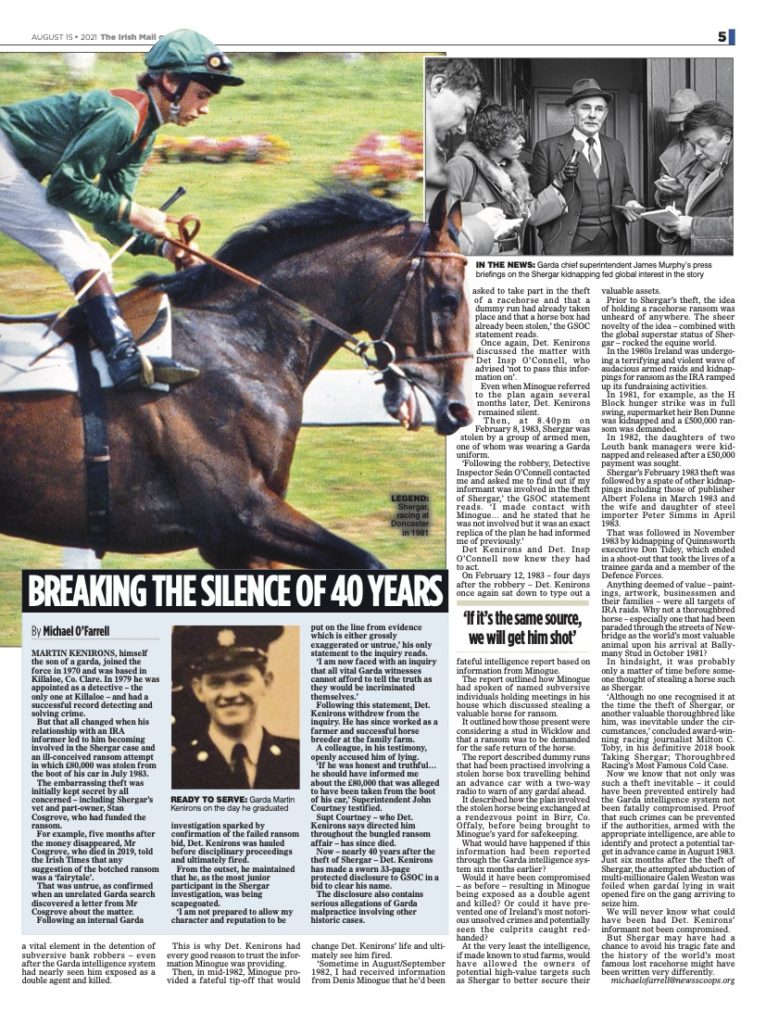GARDA authorities failed to act on foot of historical complaints of malpractice in the force for more than a year, the Irish Mail on Sunday can reveal.
The complaints were detailed in letters from former Garda Detective Martin Kenirons, who first wrote to Commissioner Drew Harris in June 2018.
That correspondence – in which concerns about the infamous kidnap of the racehorse Shergar case were outlined – was followed by further letters in October 2018 and March 2019.
These letters outlined additional concerns about:
- A murder case in which an innocent man had been ‘fitted up’ for the death of his brother;
- The withholding of a statement that cast doubt on the recollection of a vital witness in a separate trial in which a republican subversive was jailed;
- The manner in which Detective Kenirons believes he was scapegoated and fired for failures in the Shergar case.
However, all these concerns remained unaddressed until Fianna Fáil TD Jackie Cahill wrote to Commissioner Harris to ask for a review of the matter in May 2019.
Then, in August 2019 – 14 months after the complaints had first landed on the Commissioner’s desk – they were sent to the Garda Ombudsman (GSOC) for investigation.
GSOC treated the correspondence as a protected disclosure and allocated two investigators, who took a sworn 33-page statement from Detective Kenirons.
The statement was accompanied by an extensive dossier of evidence gathered by GSOC over a period of several months.
As revealed by the Irish Mail on Sunday last week, this dossier included classified files that reveal the 1983 Shergar kidnapping could have been prevented were it not for an intelligence leak within An Garda Síochána. The leak meant a trusted informant of Det. Kenirons was compromised.
In February this year, GSOC confirmed it had decided not to open a full investigation into any of these cases.
‘The Commission cannot overlook the passage of time and the difficulties arising that flow from this time gap,’ concluded chairwoman Judge Mary Ellen Ring.
Referring to concerns that a statement casting doubt on one vital witness had been withheld from a trial, Judge Ring’s assessment was that the matter, though serious, was ‘not desirable in the public interest to investigate’.
The GSOC response, however, did not address concerns raised by Det. Kenirons about the 1982 murder of farmer Richard Mackey. According to Detective Kenirons’ protected disclosure, an innocent man – the victim’s ‘simple-minded’ brother – was incorrectly prosecuted for the crime.
When asked about this apparent oversight, a spokesperson for GSOC said: ‘GSOC has no comment to make on this matter.’
Similarly, a Garda spokesperson declined to comment when asked why it had taken more than a year to forward Det. Kenirons’ complaint to GSOC.
‘An Garda Síochána is precluded from commenting on matters relating to or information contained in protected disclosures,’ he said.
Shunned My fate after I objected to framing a man who didn’t kill his brother
DICK MACKEY had not been dead for long when Detective Martin Kenirons arrived at the scene.
When the two raiders, armed with a shotgun, burst into his home at 7pm, 69-year-old Dick had tackled them head on rather than be robbed for a third time.
In the ensuing struggle Dick fell, seized by a heart attack as the raiders tied his brother Jack, 61, to a door handle with bailing twine.
Jack watched, helpless as his brother’s mouth opened and closed those last few times, before his life drained away.
Eventually, with the blade of an old mower, Jack freed himself and ran to neighbours for help.
Det. Kenirons sized up the scene near Rearcross in rural Co. Tipperary when he arrived.
Dick had blood on his ashen face. His clothes were rumpled and twisted.
The twine used to secure Jack to the door still hung from the handle, frayed and cut from the escape. Jack still had burn marks scoured into his wrists from the friction.
It was November 1st, 1982.
Though Det. Kenirons had no way of knowing it, the Mackey murder case would prove to be a fateful one for his Garda career.
‘Dealing with the public and dealing with criminals and all that, there’s no problem,’ he told the Irish Mail on Sunday.
‘Dealing with the internal politics of the Guards at times – that can be difficult.’
Today, 38 years later, the Mackey case remains a wrong that Det. Kenirons is still determined to put right.
Door-to-door inquiries that evening in the locality quickly led to a vital clue.
‘A man who had land close to Mackey’s said that at 5pm he saw two people in an amber-coloured or mustard-coloured Fiat 124 or 128 park and get out,’ recalls Det. Kenirons. ‘They left a package in the ditch.’
Curious, the witness checked and found the bag contained a shotgun in two halves. He left it as it was.
Another neighbour, a semi-disabled man living in a nearby mobile home, told Det. Kenirons he’d heard the engine of a Fiat at 7.45pm that night.
‘He said from sitting here I know the sound of every tractor and car that passes,’ Det. Kenirons remembers.
‘And that was a very rural road with very little traffic.’
‘He stated that it parked near Mackey’s and that two doors banged as if two people got out and that 15 minutes later that car pulled away.’
But after weeks of trying, local gardaí backed up by the murder squad couldn’t find the Fiat.
‘It was looking bad as far as detection was concerned,’ says Det. Kenirons.
Then – at a meeting led by local Superintendent Con McCarthy and murder squad head Pat Culhane – another scenario about the crime was put forward.
‘It was suggested maybe the two old boys had a row. Maybe this fellow [Jack] is making it up,’ recalls Det. Kenirons.
Jack was interrogated and soon Pat Culhane had a signed confession.
With the stroke of a pen, the case had officially been solved.
Det. Kenirons was asked to follow up and entered the interrogation room where Jack sat alone.
‘I said, “Jack, what the hell happened you?” And he started to cry. “I didn’t do it,” he said. “They’re making me say I did it.”‘ ‘This is not a pound of tea out of a shop,’ Det. Kenirons told Jack. ‘This is murder. You’ve made a signed statement.’
‘I’m afraid Martin. I’m afraid,’ replied Jack.
Det. Kenirons was horrified. He knew Jack to be ‘a very simple, vulnerable individual’.
He knew the home had twice previously been robbed after the Mackey brothers had returned from the bank and he knew they’d recently withdrawn a significant amount of cash again.
‘I just felt how can the thing be so false. I couldn’t believe that I was in a Garda force that was involved in this type of thing.
‘I told Superintendent Con McCarthy and Pat Culhane that I couldn’t be involved with this. I said, “If we ask him about Brian Boru he will admit it.”‘ ‘I’m out of it,’ Det. Kenirons said at the time.
‘You consider your position,’ Superintendent McCarthy, who has since died, warned.
From that point on Det. Kenirons was marked out as not being one of the team.
‘That was the beginning of the end for me,’ Det. Kenirons recalls.
‘There was an attitude there from then on. I was gossiped about around the place,’ he adds.
The following morning Superintendent McCarthy approached him. ‘You created a bit of a fuss yesterday,’ he said.
Det. Kenirons stuck with his resolve.
‘If this goes to trial, I’m telling it as it is,’ he said.
But it never went to trial. It didn’t have to.
Jack Mackey was summonsed for assault causing grievous bodily harm or death – a charge that can be dealt with summarily if there’s a guilty plea.
When Jack’s case was called in the District Court he was granted free legal aid.
The judge asked him to pick one of the solicitors sitting either side of Superintendent McCarthy.
‘He picked out the Superintendent and there was a big laugh,’ recalls Det. Kenirons.
‘He did not know the difference between a Superintendent in blue uniform and a solicitor.’
There and then, on the advice of his new solicitor, Jack pleaded guilty and received a suspended sentence.
Case closed. A murder that had been dramatic front page news in the national newspapers in the days after the raid that killed Richard Mackey was put to bed without a single public mention anywhere.
Several weeks later Det. Kenirons met Jack by chance. He was oblivious to his conviction, and told the detective as much.
‘I suppose it will take you six months more to get the crowd that killed Dick,’ he asked the detective.
Det. Kenirons told the MoS: ‘He was convicted at this stage, had pleaded guilty.
‘He just didn’t have a clue and I could see that the whole thing passed over his head.
‘If he got jail, he would have realised he was being wronged, but he only had the day over in court and went home and that was it.’
The case of Jack Mackey was not the only reason Det. Kenirons lost faith in those in charge of An Garda Síochána. He’d seen other questionable cases too.
In one, Det. Kenirons watched as a statement was withheld from the Director of Public Prosecutions (DPP) that may have cast doubt on the prosecution of an republican subversive who was jailed.
The sleight of hand resulted in two sworn statements being taken from a vital witness in the case.
In the first statement, the witness swore they were not sure at all of a vital fact.
In the second statement, taken under pressure during an interrogation that lasted hours, the same witness performed a complete turnaround.
The first sworn statement, which would have cast doubt on the second, was kept completely secret and never provided to the DPP or the court.
The accused was subsequently jailed, thanks in part to the second statement, without ever having an opportunity to question its validity.
To Det. Kenirons the issue amounted to evidence being tampered with.
‘The weaker statement was excluded from the book of evidence,’ he told the MoS. ‘Where do we stop with this? We’re coercing witnesses to make damning statements.’
In another instance, exclusively reported by the MoS last week, Det. Kenirons had direct experience of a Garda intelligence failure that had compromised a vital informant.
On foot of information provided by an informant called Denis Minogue, Det. Kenirons had been warned that the son of a Garda officer was associated with the IRA.
His 1981 report detailed how the officer’s son had been seeking to purchase milk churns and the use of a yard in which trucks of fertiliser could be secretly stored.
The tip-off, involving information about commonly used bomb-making materials, was something that required complete secrecy.
‘The matter should be handled very delicately and no action should be taken except in consultation with this branch,’ was how Garda intelligence in HQ responded as the report was noted on file a few days later.
But the information leaked somehow, resulting in the abduction and torture of Det. Keniron’s source by the IRA as they sought to identify the mole in their ranks.
‘I thought I was being a very good detective when I exposed a Garda’s son as being involved with the Provos,’ said Det. Kenirons.
‘But then I realised the Provos nearly had it as quick as I reported it it was not treated as a detective coming with good intelligence – instead it was treated as Kenirons shafting a Garda officer.’
The leak meant that, in order to protect his source, Det. Kenirons was unable to pass on intelligence relating to the movement of IRA weapons in horse trucks.
He was also unable to warn Garda HQ that the IRA were planning to kidnap a valuable horse such as Shergar – something that could have prevented one of Ireland’s most infamous unsolved crimes.
Ultimately, Det. Kenirons believes the Shergar abduction and his association with a subsequent botched ransom attempt gave his enemies an opportunity to get rid of him. The bungled ransom attempt had seen £80,000 stolen from the boot of Det. Kenirons car.
‘When the Shergar thing went wrong I knew no one was going to put in a good word for me,’ he remarked.
When an internal disciplinary inquiry was established into the botched Shergar ransom in 1986 Det. Kenirons knew his time had come.
‘I could see how it was all starting to unravel,’ he told the MoS this week.
So he sent the inquiry a statement and withdrew, knowing he would be sacked.
‘I am not prepared to allow my character and reputation to be put on the line from evidence that is either grossly exaggerated or untrue,’ the statement reads.
His statement made it clear that Det. Kenirons knew from experience how he was perfectly capable of being set up by those who wanted him out.
‘Having knowledge of other investigations it should be easy to see my reluctance to defend an inquiry where I am being made the scapegoat,’ the statement reads.
‘I have an amount of knowledge on the means employed by Garda investigations to extract evidence,’ the statement continues.
The statement went on to detail Det. Kenirons’ knowledge of the manner in which evidence had been manipulated in the case against the subversive criminal.
And it described in detail how Det. Kenirons believed Jack Mackey had been set up for his brother’s murder.
‘I was completely disgusted to think that an aged, simple-minded man like Jack Mackey was treated in this way by people who made him fit the crime,’ the statement to the inquiry reads.
He concluded that he could not have confidence in the inquiry and formally refused to participate.
That was 35 years ago.
Today, at the age of 69, Det. Kenirons still cannot let go.
‘The Jack Mackey thing always haunted me,’ he said. ‘I think poor Jack Mackey deserves his good name.’
That’s all that Martin Kenirons wants too.

